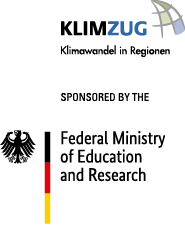Dynamic adaptation of regional planning and development processes to the effects of climate change
dynaklim – Using the example of the Emscher-Lippe region (Ruhr area)

Coordinated by the FiW, the network and research project dynaklim, which was funded by the German Federal Ministry of Education and Research (BMBF), developed the basis for future and forward-looking adaptation actions to the effects of climate change. The project was realised in cooperation with stakeholders from the Emscher-Lippe region between July 2009 and February 2015.






